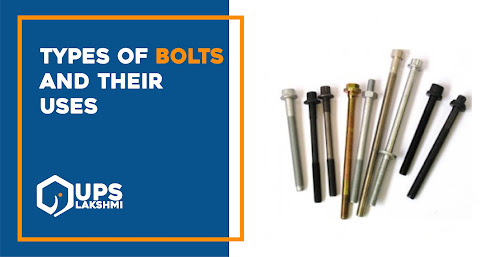Types of Bolts and Their Uses
A bolt is a form of fastener used to connect two parts. The bolts join the parts in a non-permanent manner, allowing the parts to be separated using an appropriate tool.
A bolt is made up of
three parts, which are
1. Head: The upper
portion of the bolt is referred to as the "head." The shape of the
head can vary. The shape of the head is determined by the purpose of the bolt.
2. Shank: The shank
is the cylindrical portion of the bolt. The bolt's tail end is threaded to a
sufficient length for a nut to be engaged on it. In addition, the shank's end
is clipped to facilitate inserting a hole and a nut on it.
3. Threading:
Threading is present on all bolts. Threading is the movement of a bolt
into or out of a work piece. Most bolts, however, do not have complete
threading. They have a smooth leg ahead of them, followed by threading. The
shank may cover a larger surface area than the thread depending on the type of
bolt. All bolts, however, have threading.
To join them, the
threading of a bolt works with the internal threading of the workpiece.
External threading is located outside the bolts' bottommost part. This allows
the external threading bolt to be moved into or out of the work piece’s
internal threading.
Bolt types include:
Bolts are one of the
most versatile structural fasteners, with a wide range of configurations to
suit various materials and strength requirements.
Some of the prominent ones are:
Stud bolts:
A threaded rod, also
known as a stud bolt, is a long rod that is threaded on both ends; the thread
may extend the entire length of the rod. They are externally threaded fasteners
without a head that are used with two nuts on either side to replace a
traditional bolt and nut combination. Flange connectors frequently employ stud
bolts.
Hex fit bolt:
Hex bolts have a
six-sided hexagonal-shaped head and are a type of threaded bolt. Hex bolts come
in two types: fully threaded and partially threaded (with a clear shank along
part of the body) and can be used in a variety of applications, including
machinery and construction.
They come in a variety of types, sizes, materials, and finishes, giving you the freedom and flexibility to choose the finest bolt for your task or application. Due to their unusual head form, hex bolts are also known as hex head bolts or hexagon bolts.
Cylinder head bolts:
Bolts that fasten an engine's cylinder heads to the engine block are known as cylinder head bolts. They serve as a link between the engine block, the cylinder head gasket, and the cylinder head.
The bolt tightening force is critical for the mutual sealing of the combustion chamber, lubrication and coolant channels, and the ambient air. A job that necessitates flawless execution with cold or extremely hot engines, as well as negative and positive pressures.
The bolt force provides the so-called surface pressure when tightening (torqueing) the cylinder-head bolts, which is necessary for achieving a flawless seal. Bolts have a significant impact on surface pressure quality when used in conjunction with the torqueing method.
Shoulder bolts:
Shoulder bolts are screws that are divided into three parts: the head, the unthreaded shoulder, and the threads. Integral threads are present on half or less of the screw shank, with the remaining shaft expanded and smooth to allow the bolted material to spin or move around the screw axis.
Shoulder screws, like all other screws, are designed to hold items together and in a specific location. These screws, on the other hand, are intended for parts that require a mounting pin, joint, shaft, dowel, pivot, or sliding motion.
Things like: bearings, machine assistance, precision spacing, motion guiding, etc.
Banjo bolt:
A banjo bolt is a
component of a banjo fitting. Pressurized fluid is frequently passed through
banjo fittings. They're most commonly seen in motorcycle brake systems, but
this type of fluid-transfer fitting has a wide range of non-motorcycle
applications.
A banjo bolt is a hollow bolt with a hole on one side. This hole allows fluid to flow into the fitting's other half, which is also hollow.
Universal Precision Screws
is a leading manufacturer of top quality industrial and commercial fasteners
with a track record parallel to none in the region. Universal Precision Screws
offers a wide range of products, including bolts, dowel pins, fasteners, and
more. The company's manufacturing facilities are located in Rohtak, India.
UPS is committed to
providing high quality products at competitive prices. The company takes great
pride in its ability to deliver products within tight timeframes without sacrificing
quality or service levels.




Comments
Post a Comment